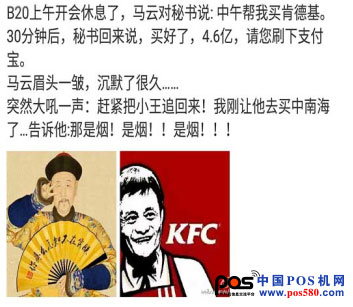Last weekend, China’s pos machine network Xiaobian came to travel once and said that when I was in the beautiful scenery of the ancient town of Zhenlian, the circle of friends was swept by such a paragraph:

After reading the news, it turned out that Ma Yun took the KFC in the bag, specifically to invest in part of the shares of Yum! It is understood that Yum! Brands divested its sluggish China business in October 2015. After the divestiture, it established “Parkson China†and plans to list on the New York Stock Exchange in November 2016. On the evening of September 2, the first weekend of September, Yum! Group announced that Chunhua Capital and Ant Financial Services had invested US$460 million in the company’s business. This move means that the capital behind the popular “foreign fast food†has begun to accelerate the localization and evolution. It also indicates that the catering industry has a spring breeze in mobile payments.
How to understand Ma Yun's move will bring a spring breeze to food and beverage payment?
First, the use of Alipay offline expansion scenarios, driving the development of intelligent identification equipment
KFC's consumption scene has the basic characteristics of small amount and high frequency, which is very suitable for the development of mobile payment. Similarly, the Pizza Hut Group's Pizza Hut has no KFC high frequency, but the customer price is higher, which is also a favorable mobile payment promotion resource. Ma Yun chose to use ants to buy shares in Yum! China. The biggest idea is to expand the offline usage of Alipay. Earlier in June 2016, Tencent QQ Wallet announced cooperation with McDonald's. McDonald's has been involved in Alipay, WeChat payment, and QQ wallet. In combination, the two major domestic high-frequency consumer fast food companies have opened the door to mobile payments.

At present, Alibaba and Tencent's payment business has entered the fast food industry, and it has a strong momentum. In the face of the competition between the two big players in online payment, the most profitable is the manufacturer of intelligent identification equipment. This war without smoke has made consumers accept mobile payments subtly and is willing to do so. The increasing number of mobile payment scenarios has brought tremendous development opportunities to smart scan code recognition device hardware and software vendors.
Second, the economic downturn, the restaurant industry is sought after
In the past year, although China is still in an economic downturn, according to public data, Yum! China’s business accounts for half of the global business of Baisheng Catering Group. In 2015, Yum’s turnover in China exceeded 50 billion yuan. It is very eye-catching. The sluggish economic environment has also made more capital not willing to continue to pursue the "burning money" and "bubble" industries. The catering industry, which was not optimistic in the past, is gradually favored. Although Ma Yun’s move was spread on the Internet into “revenge†for 30 years, it is no doubt that this “revenge†is a shot in the catering industry.
The people are eating for the sky, and the catering industry is constantly being capitalized. However, the ultimate focus is on payment. No matter how the payment form changes, it is inseparable from the identification equipment, collection/cash register system, and ticket printing. POS vendors who are committed to serving the catering industry must seize the opportunity in such a favorable environment and share a rich share of the capital competition.
Third, the trend of catering O2O, the POS industry will be another city
Whether it is Ma Yun's shareholding in Yum! China or Tencent QQ wallet and M record cooperation, it is driven by the continuous development of the O2O model of the food and beverage industry. For the catering industry, Alibaba's traditional e-commerce and Tencent's traditional socialization have been unable to meet the needs of people's fast-growing users. Therefore, in the future, the catering industry will inevitably move toward a more extensive O2O form. On the software level, the latest version of Alipay has added social features and store search functions like public comments. Xiaobian guessed that Alipay did not simply add social features, but wanted to get better user big data to develop Tencent's WeChat payment and QQ wallet have always been based on social software, enriching the social features. Therefore, Xiaobian is daring to speculate that the future catering O2O form will be a combination of service, payment and social.

In fact, catering O2O has long been nothing new. Since 2013, a large number of online take-out platforms, such as Hungry, Meituan Takeaway, Baidu Glutinous Rice, etc., have made the name of the catering O2O begin to bombard people's eyes. With the enthusiasm of catering O2O, many excellent POS companies targeting catering O2O also stand out. For example, Tianbo produces a business fire-selling order artifact and an audio-based O2O integration platform... The high-quality POS company has made outstanding contributions to the catering O2O, and added practicality for improving the mobile payment ecosystem and improving the user experience. Catering O2O brings a broader market to the POS industry, while the POS industry offers more possibilities for catering O2O.
After changing the Internet, banking, and logistics industries, Ma Yun will enter the catering industry this time. This "wind-up" hero will bring a breeze to the food and beverage payment, it is really worth looking forward to.
American Style Gn Pan,Gastronorm Trays With Lids,Stainless Steel Gastronorm,Ss Gn Pan
Jiangmen Junerte Stainless Steel Kitchenware Co.,Ltd , https://www.jetkitchenwarejm.com
